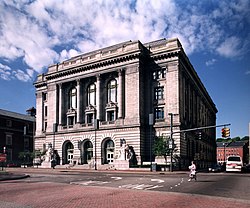Federal Building (Providence, Rhode Island)
|
Federal Building
|
|

Federal Building and U.S. Courthouse, September 2003
|
|
| Location | Kennedy Plaza, Providence, Rhode Island |
|---|---|
| Coordinates | 41°49′33″N 71°24′40″W / 41.82583°N 71.41111°WCoordinates: 41°49′33″N 71°24′40″W / 41.82583°N 71.41111°W |
| Area | 0 acres (0 ha) |
| Built | 1903 |
| Architect | Clarke & Howe |
| Architectural style | Beaux Arts |
| Part of | Downtown Providence Historic District (#84001967) |
| NRHP Reference # | 72000040 |
| Significant dates | |
| Added to NRHP | April 13, 1972 |
| Designated CP | February 10, 1984 |
The Federal Building is a historic post office, courthouse and custom house on Kennedy Plaza in downtown Providence, Rhode Island. It is a courthouse for the United States District Court for the District of Rhode Island. It was built in 1908 by Clarke & Howe of limestone and steel and has a courtyard in the center.
In 1900 the rapidly growing city of Providence began pressing Rhode Island’s congressional delegation and officials in Washington about the need for a new federal building to replace the U.S. Customshouse. Congress was ultimately persuaded, in 1902, to appropriate $1,000,000 for a Post Office, Court House and Custom House. In return, the city donated a site across from City Hall, at the eastern end of Exchange Place, to the federal government. The transfer was completed July 7, 1902.
The following year, the U.S. Treasury Department held a national design competition that attracted ten entries. The local firm of Clarke and Howe was unanimously selected as the winner. The jury, which consisted of James Knox Taylor, Supervising Architect of the Treasury, and several other prominent architects, remarked that the design was "an artistic building, excellently planned for its purpose," and that it would be "an ornament to the city of Providence." It was one of 35 federal buildings contracted to architectural firms under the provisions of the Tarsney Act of 1893. The Act authorized the Treasury Secretary to use private architects, selected through competition, to design Federal buildings and reflected a growing demand for greater architectural standards for public buildings.
Contractors Horton and Hemenway began construction in 1904—only two years after passage of the first omnibus public buildings law, which significantly changed the federal construction process. Construction was closely monitored by the Supervising Architect’s Office with monthly progress photographs and building material samples sent to Washington. Construction required relocating railroad tracks and bridging the Providence River. Completed in 1908 at a cost of about $1,300,000, the Providence Post Office, Court House and Custom House was hailed as one of the finest federal buildings outside Washington.
...
Wikipedia

